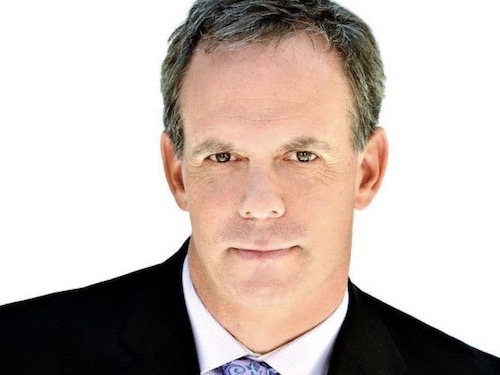Meet John Ruttle

My name is John Ruttle and I’m the senior producer of CTV News Ottawa. I produce the CTV News at Six, which is our flagship program.
I graduated from Carleton in 1990. And before I graduated, I worked at CHRO Pembroke, and CHEX TV in Peterborough. I started at CTV Ottawa just as I was finishing up at Carleton. I stayed there for a couple of years. Then I went back to CHRO Pembroke, where I was a reporter, and then producer, and then the news director. And now I’ve come back to CTV News Ottawa where I’ve been for almost 27 years as a reporter, assignment editor and now the senior producer. So I’ve been in local news the whole time.
What inspired you to be a journalist?
My dad was in television. He worked at CTV in Toronto so I grew up sort of watching his career in TV when it was kind of a young industry. And I just really liked the medium and the storytelling.
It’s just a really fun way to tell emotional stories, and to get into the community in a way that other media doesn’t quite capture.
But I was also just drawn to television. As a kid, I watched a lot of television news. I just thought it would be an interesting line of work and it’s been absolutely that.
What are some of the biggest lessons you’ve learned throughout your career?
To adapt. Because the pace of the industry is accelerating. It’s important to be as current as possible, on all forms of communication. When I started in about ‘87, I wrote on a typewriter. I remember when the first computer came into the television newsroom, and then the revolution of the Internet, and social media.
So I guess the advice that I would suggest is try to keep up with it. Try to be as current as possible and be ready to adapt, because changes can come faster than you realize.
What struggles have you faced throughout your career, and how have you addressed them?
It is a daily challenge is to accurately reflect the stories of my sources, and it’s not something at which I always succeed. The brevity needed to be in broadcast journalism, it’s an overarching sword above your head. Sources are always surprised at how brief the stories are on the air, or even online. So, I feel that the stories we tell are incomplete, and I don’t like that.
To overcome this, I’m honest with my sources. I say “Listen, I can only use a little bit of this. So, what is the most important thing you want to express?” So it’s trying to convey to people that this medium that we’re dealing with right now is really targeted and we don’t have a ton of time.
How do you cope or how do you address mental health challenges that you’ve faced as a journalist?
I just try to be as present and as active as I can be. So that as I’m continue in my mid-fifties, I can be as youthful as I can imagine.
And always keep learning. I never want to be the person who says “Well, I already know that,” or “I already know how this is going to turn out.” I continue to be curious and continue to want to learn new things.
What’s your favourite part about being a journalist?
Learning things first. I like I like knowing things first. I like that it’s my job to try to figure out what’s coming soon. You know, I’m sitting in front of my computer right now with TV’s on and whatnot, there’s a ton of email in front of me, there’s huge events happening.
What advice you have for those aspiring to go into the media industry?
Believe in yourself. News is highly subjective. What constitutes as a news story is different for many people. So you can’t be second guessing yourself all the time when you make decisions about news. So, trust your judgment, be tenacious, be curious.
Is there anything else that you think aspiring journalists should know?
I would urge you to be present with the idea of fake news. And I don’t say so lightly. It has had a ton of negative effects, one of which is the apparent erosion of public trust in journalism in the last three to five years. It didn’t start with the US president, but it accelerated with him.
We are reporting the news everyday, and calling our lawyer a couple of times a week to make sure that we are right and we are legally protected. We don’t report the news lightly, but people in great numbers write to us to say we’re merely pushing an agenda. It’s highly unsettling. So be weary of that.
Interview conducted by JSOC second year representative, Jasdeep Kaur.